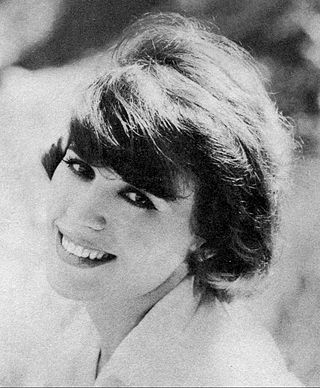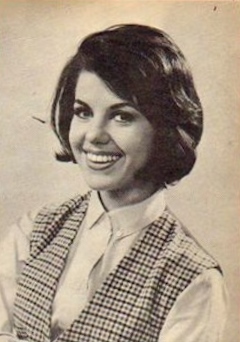Related Research Articles

Giovanna Carmella Babbo, known professionally as Joni James, was an American singer of traditional pop music.

Axel Stordahl was an American arranger who was active from the late 1930s through the 1950s. He is perhaps best known for his work with Frank Sinatra in the 1940s at Columbia Records. With his sophisticated orchestrations, Stordahl is credited with helping to bring pop arranging into the modern age.

Paul Weston was an American pianist, arranger, composer, and conductor who worked in music and television from the 1930s to the 1970s, pioneering mood music and becoming known as "the Father of Mood Music". His compositions include popular music songs such as "I Should Care", "Day by Day", and "Shrimp Boats". He also wrote classical pieces, including "Crescent City Suite" and religious music, authoring several hymns and masses.

Ramón "Mongo" Santamaría Rodríguez was a Cuban percussionist and bandleader who spent most of his career in the United States. Primarily a conga drummer, Santamaría was a leading figure in the pachanga and boogaloo dance crazes of the 1960s. His biggest hit was his rendition of Herbie Hancock's "Watermelon Man", which was inducted into the Grammy Hall of Fame in 1998. From the 1970s, he recorded mainly salsa and Latin jazz, before retiring in the late 1990s.

Raymundo "Ray" Barretto Pagán was an American percussionist and bandleader of Puerto Rican descent. Throughout his career as a percussionist, he played a wide variety of Latin music styles, as well as Latin jazz. His first hit, "El Watusi", was recorded by his Charanga Moderna in 1962, becoming the most successful pachanga song in the United States. In the late 1960s, Barretto became one of the leading exponents of boogaloo and what would later be known as salsa. Nonetheless, many of Barretto's recordings would remain rooted in more traditional genres such as son cubano. A master of the descarga, Barretto was a long-time member of the Fania All-Stars. His success continued into the 1970s with songs such as "Cocinando" and "Indestructible". His last album for Fania Records, Soy dichoso, was released in 1990. He then formed the New World Spirit jazz ensemble and continued to tour and record until his death in 2006.

Mickey & Sylvia was an American R&B duo composed of Mickey Baker and Sylvia Vanderpool, who later became Sylvia Robinson. They are best known for their number-one R&B single "Love Is Strange" in 1957.

Hugo Mario Montenegro was an American orchestra leader and composer of film soundtracks. His best-known work is interpretations of the music from Spaghetti Westerns, especially his cover version of Ennio Morricone's main theme from the 1966 film The Good, the Bad and the Ugly. He composed the score for the 1969 Western Charro!, which starred Elvis Presley.
Pachanga is a genre of music which is described as a mixture of son montuno and merengue and has an accompanying signature style of dance. This type of music has a festive, lively style and is marked by jocular, mischievous lyrics. Pachanga originated in Cuba in the 1950s and played an important role in the evolution of Caribbean style music as it is today. Considered a prominent contributor to the eventual rise of salsa, Pachanga itself is an offshoot of Charanga style music. Very similar in sound to Cha-Cha but with a notably stronger down-beat, Pachanga once experienced massive popularity all across the Caribbean and was brought to the United States by Cuban immigrants post World War II. This led to an explosion of Pachanga music in Cuban music clubs that influenced Latin culture in the United States for decades to come.

"Vaya con Dios (May God Be With You)" (, literally "Go with God") is a popular song written by Larry Russell, Inez James, and Buddy Pepper, and first recorded by Anita O'Day in December 1952. Les Paul and Mary Ford had a No. 1 recording of the song in 1953. Members of the Western Writers of America chose it as one of the Top 100 Western songs of all time.

Raphael Homer "Ray" Bryant was an American jazz pianist, composer, and arranger.
Alexander Emil Caiola was an American guitarist, composer and arranger, who spanned a variety of music genres including jazz, country, rock, and pop. He recorded over fifty albums and worked with some of the biggest names in music during the 20th century, including Elvis Presley, Ray Conniff, Ferrante & Teicher, Frank Sinatra, Percy Faith, Buddy Holly, Mitch Miller, and Tony Bennett.

Mark Howe Murphy was an American jazz singer based at various times in New York City, Los Angeles, London, and San Francisco. He recorded 51 albums under his own name during his lifetime and was principally known for his innovative vocal improvisations. He was the recipient of the 1996, 1997, 2000, and 2001 Down Beat magazine readers' jazz poll for Best Male Vocalist and was also nominated five times for the Grammy Award for Best Vocal Jazz Performance. He wrote lyrics to the jazz tunes "Stolen Moments" and "Red Clay".

Raelene Claire Claussen, known professionally as Sue Raney is an American jazz singer. Raney was signed by Capitol Records in 1957 at age 17. That same year, she recorded her debut album, When Your Lover Has Gone, produced by Nelson Riddle.
Alvin Stoller was an American jazz drummer. Though he seems to have been largely forgotten, he was held in high regard in the 1940s and 1950s. He was best known for playing drums on both Mitch Miller's recording of "The Yellow Rose of Texas" and Stan Freberg's parody of Miller's recording.
This is the discography of recordings by Duke Ellington, including those nominally led by his sidemen, and his later collaborations with musicians with whom Ellington had generally not previously recorded.
Joseph Armand Castro was an American bebop jazz pianist, based primarily on the West Coast of the United States.

Takeshi "Tak" Shindo was an American musician, composer and arranger. He was one of the prominent artists in the exotica music genre during the late 1950s and early 1960s. Shindo also founded a dance band in 1947 and was a frequent lecturer and writer on Japanese music. He first gained prominence for his work on the 1957 motion picture Sayonara, served as the musical director for the television series Gunsmoke, and composed theme music for The Ed Sullivan Show and Wagon Train. He is most remembered for the exotica albums he released from 1958 to 1962, including Mganga! The Primitive Sounds of Tak Shindo (1958), Brass and Bamboo (1959) and Accent on Bamboo (1960). He also released several albums in Japan during the mid-1960s that blended American and Japanese musical traditions. During the 1950s and 1960s, Shindo was a columnist for the Rafu Shimpo covering classical and popular music. In 1980, Shindo made a documentary film, Encounter with the Past, about the Manzanar relocation camp where he was relocated in 1942 as part of the Japanese American internment policy.

Audrey Arno was a German singer and actress. Her biggest success was in France in the 1960s, where for a time she was known simply as Audrey.
Doris Allen was an American soul singer. She and Genie Pace were signed to the independent label Jade Records, started by former Bethlehem Records executive Jim Bright, in 1957. Billboard magazine referred to them as "thrushes". Allen went on to receive some acclaim as a singer of soul music with partner Big John Hamilton in the 1960s. Her songs include "A Shell of a Woman", "Kiss Yourself For Me", "Let a Little Love In", "Hanging Heavy In My Mind", "A Place in My Heart", "Them Changes", "Bright Star", "Candy from a Baby", "Treat Me Like a Woman", "Full Time Fool", and "Night Time Is the Right Time". Allen was also recorded on Emerald Coast Records out of Panama City, Florida.
"La Pachanga" is a 1959 song by Eduardo Davidson, which is considered the classic example of the pachanga genre. The song was premiered by the Charanga band of the flautist Melquiades Fundora in Havana. The lyrics include an invitation to the dance: "Señores que pachanga, me voy con la pachanga. Ay mamita que'pachanga, me voy con la pachanga."
References
- ↑ Billboard - 6 May 1957 - Page 20 MUSIC-RADIO THE BILLBOARD MAY 6, 1957 NEW YORK — NEW YORK — Jade Records, indie label headed by ex-Bethlehem exec, Jim Bright, is enlarging its artists roster and distribution. Last week the outfit inked two thrushes, Genie Pace and Doris Allen, for both singles and albums.
- ↑ "Genie casts a musical spell". The Journal News. 6 August 1972. Retrieved 25 May 2023.
- 1 2 Billboard . March 7, 1960. p. 44.
{{cite news}}: Missing or empty|title=(help) - ↑ Billboard - 1961 March 20 p99 "LA PACHANGA (Peer, BMI) GENIE PACE (1:54) Capitol 4552 AUDREY ARNO AND THE HAZY OSTERWALD SEXTET (2:36) DECCA 31238 HUGO AND LUIGI (2:15) RCA Victor 7868— A bright new dance craze from the Latins has resulted in these three good recordings."
- ↑ "Pick Hits". Billboard. March 20, 1960. p. 108. Retrieved 19 November 2013.
- ↑ Billboard. March 10, 1960. p. 30.
{{cite news}}: Missing or empty|title=(help)